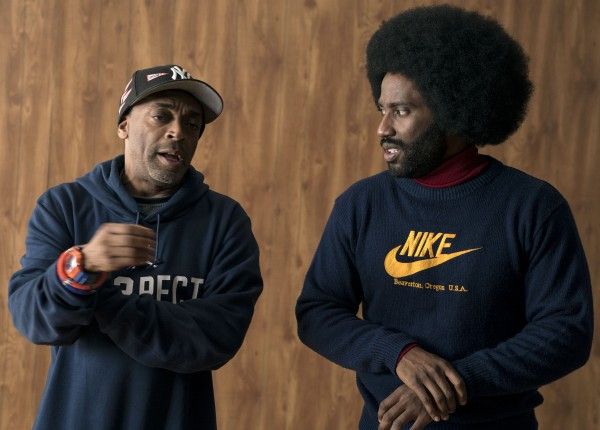Our long national nightmare is over. And Green Book is officially the Best Picture of 2018. So ended one of the most contentious, confusing, and frustrating awards seasons in recent memory. Since September, back when A Star Is Born was the frontrunner in pretty much all the major categories (oh to be young and naïve again!), this year’s Oscar season has been one of extreme ups and downs. Controversies flamed up, tensions flared, and yet at every turn the negative buzz surrounding films like Green Book and Bohemian Rhapsody seemed not only to not register with those inside the industry, but perhaps even embolden their love for these “problematic” movies in the first place.
When all was said and done last night, Green Book took home three awards—Best Picture, Original Screenplay, and Supporting Actor—and Bohemian Rhapsody topped all other films with the most Oscars total (despite the fact that it was directed by no one in particular, according to those acceptance speeches). It’s a strange and somehow fitting end to the long trek that got us here, but as someone who’s been covering this race intensely for the past six months, last night’s telecast was not without its enlightening lessons with regards to how we view the Oscars. Here’s what we learned.
The Oscars Don’t Need a Host
One of the loudest—and most consistent—missteps throughout this Oscar season was the Academy announcing sweeping changes to the Oscars telecast that were then met with immediate outrage. First the Popular Film Oscar came and went, then they tried to get away with not airing four categories live. At every turn, the Academy was publicly shamed into reversing its decisions—which at heart were in search of shortening the telecast to three hours, per ABC’s wishes.
But the one big change Oscars producers Donna Gigliotti and Glenn Weiss stuck with was one they actually stumbled upon: having no host. Dwayne Johnson was first approached for the hosting gig, only to turn it down due to scheduling issues. Then the Academy announced Kevin Hart as the show’s host, only for Hart to resign a mere 48 hours later after he refused to apologize for past homophobic tweets. With time running out, the Academy was forced to forge ahead without a host… and it was great?
There was a lot of apprehension about the show moving forward without a host for the first time since 1989, but it turned out to be an inspired decision. With no monologue or regular bits to attend to, the show moved forward at a clip. There was time to award all the categories live and air performances of the Best Original Song nominees, and the show wasn’t constantly grinding to a halt to present “bits” meant to lighten the mood. The focus was on the films and the winners, as it should be.
No offense to Ellen DeGeneres’ selfie skills, but using celebrities’ starpower as presenters was a far more inspiring and off-the-cuff way to engage with audience members, and the show never felt bogged down. Has any Oscars monologue in recent memory been as satisfying as Tina Fey, Amy Poehler, and Maya Rudolph’s brief albeit hilarious comments at the top of the show? Moreover, without the burden of hosting (a truly thankless job), it was easier for the producers to convince people of Fey, Poehler, and Rudolph’s caliber to show up, tell a couple jokes, and move on.
For all the controversy surrounding the Oscar producers’ decisions this year, ironically enough it feels like they hit upon something that could become commonplace in ceremonies to come.
Academy Membership Is in a Serious State of Flux
The Screenplay awards last night are the clearest example of how the Academy is not voting as one giant monolith, and indeed is in the midst of a serious state of evolution. On the one hand you have Best Adapted Screenplay winner BlacKkKlansman, a challenging film about race that lays bare the insidious and dangerous nature of hate, while also reminding audiences that America is still suffering the effects of racism and glorified hatred today—there’s no easy solution, and things are still incredibly troubling.
On the other hand, Best Original Screenplay winner Green Book simplifies race relations to the notion of “can’t we all just get along?” while ignoring the systemic roadblocks that remain in place to keep people of color at a disadvantage, telling the entire story from the racist white protagonist’s point of view which subtextually underlines the fact that it’s his story that’s important, not the African-American who’s subjected to subhuman treatment at every turn.
It’s a snapshot of an Academy in flux. Over the last few years, Academy president Cheryl Boone Isaacs made a concerted effort to create a younger, more diverse voting body by inviting new talents like Donald Glover, Timothée Chalamet, and Chloe Zhao to become members. This push towards the future of Hollywood is perhaps at least somewhat responsible for historic wins last night like Hannah Beachler becoming the first African-American to win Best Production Design for Black Panther, or Ludwig Goransson winning Best Original Score for his sonically diverse work on the Marvel Studios film.
But then that’s contrasted with Green Book winning Best Picture, and indeed it was certainly a sight to witness a sea of white faces accepting the Academy’s award for a movie about racism. Especially when two other films tackling race relations—BlacKkKlansman and Black Panther—were not only nominated for Best Picture, but were made by a majority of black filmmakers.
This isn’t necessarily a case of Green Book not being “woke” enough, but instead the Academy looking at choices that offer a more challenging, complex, and yes in some ways pessimistic (but also realistic) view of race relations in America and opting to go with the fairy tale choice. It’s not a new notion. Spike Lee’s iconic Do the Right Thing was famously not even nominated for Best Picture the year Driving Miss Daisy won. But it is a reminder that for all the pushes towards creating a voting body that doesn’t make the same boring choices year after year, there still exists a substantial section of voters who prefer old fashioned Best Picture winners like Green Book.
Surprises Can Still Happen
This was famously hailed as one of the most unpredictable Best Picture races in recent memory, and while Green Book’s win reinforced the idea of the Producers Guild Award winner as the most consistent harbinger of Oscar glory, there were still surprises to be found. Most prominently, Olivia Colman’s Best Actress win for The Favourite. Colman was pegged as an early frontrunner in this category, only to be usurped by Lady Gaga following the smashing success of A Star Is Born. Then Glenn Close’s surprise Golden Globes win (and subsequent speech) for The Wife launched her into frontrunner status, and a narrative built up around the acting veteran that it was “her time”—one all too familiar to Academy voters.
However, Close couldn’t overcome the fact that few had actually seen The Wife, or perhaps some thought her win was a foregone conclusion and wanted to throw some love Colman’s way. Regardless, it resulted in one of the most exciting moments of the night, as Colman delivered a truly humble (and adorable) speech, admitting she was just as surprised by the win as we all were. This is why people watch the Oscars. For candid moments like that. Speaking of which…
Yes, Airing all 24 Categories Live Is Actually Important
The Academy famously proposed dropped four categories from the live telecast in favor of airing edited versions of the acceptance speeches later in the show. It was only after the American Society of Cinematographers strongly objected, and an open letter signed by many notable faces in Hollywood urged the Academy to change its mind, that the decision was reversed. As last night’s telecast was proof positive of why it’s important to air all the categories live.
How terrific was the speech from the filmmakers behind Period. End of Sentence.? And how delightful was it to see Alfonso Cuarón shout out three-time Oscar winner and longtime collaborator Emmanuel Lubezki in his winning speech for Best Cinematography, which was one of the categories that was due to be cut? And consider for a moment if Best Production Design had been one of the categories deemed inessential for the live telecast, thereby missing out on the spontaneity of the moment when Hannah Beachler made history as the first African-American to ever win in the category?
You never know who’s going to make a truly unforgettable “Oscars moment”, so let’s just stick to handing out all of the Oscars live from now on and pretend that embarrassing idea never happened. Deal?
Why Didn’t ‘A Star Is Born’ Win Everything, Again?
This is less a lesson learned and more a “seriously, what the hell happened?”, but seriously, what the hell happened with A Star Is Born? The Academy was fretting over viewership ever since last year’s ratings hit an all-time low. They wanted a hit. They needed a hit (see: the Popular Film Oscar category). And A Star Is Born was right there! At $424.4 million worldwide it was a true box office smash, and unlike Bohemian Rhapsody, it was also a critical darling. Reviewers raved about Bradley Cooper’s wildly impressive directing skills and his best performance yet, and Lady Gaga turned heads with a stunning feature-film acting debut. If the Oscars were looking for a big, popular, well-made film that celebrates grand Hollywood filmmaking, A Star Is Born was it.
And yet, when the dust settled, the film managed just one single award: Best Original Song. The “magic” of A Star Is Born was made all the more clear when Cooper and Gaga took the Oscars stage to perform “Shallow”, resulting in a true show-stopping moment. The performance was shot in an intimate manner mimicking Cooper’s approach to the actual film (indeed, the approach of the Oscars performance was Cooper’s idea), and were those literal sparks flying between Cooper and Gaga or was I seeing things?
The “riches-to-rags” story of A Star Is Born’s Oscar season will no doubt be covered for years to come—and pointed to as cautionary tale—but it remains one of the more baffling trajectories of an “Oscar movie” in recent memory.
Final Thoughts
Like every Oscars ceremony, this one was a mixed bag. There were wins people were happy about, others that were disappointing, and when all was said and done, Best Picture went not to one of the multiple box office smashes, but a drama that performed modestly at the box office. Honestly, the biggest surprise of the season was that the Oscars telecast was far from a disaster, and in truth probably one of the best Oscar shows in a long while.
And so now my humble Oscar Beat column goes back into hibernation—for a few months at least. Then we’ll do this all over again this fall. We don’t yet know what the films will be, or what might win, but you can rest assured there will be strong thoughts throughout the season. Not for the sake of being outraged or crafting #hottakes, but because we love movies, and the Oscars—no matter how flawed—still represent “Hollywood’s biggest night.”




